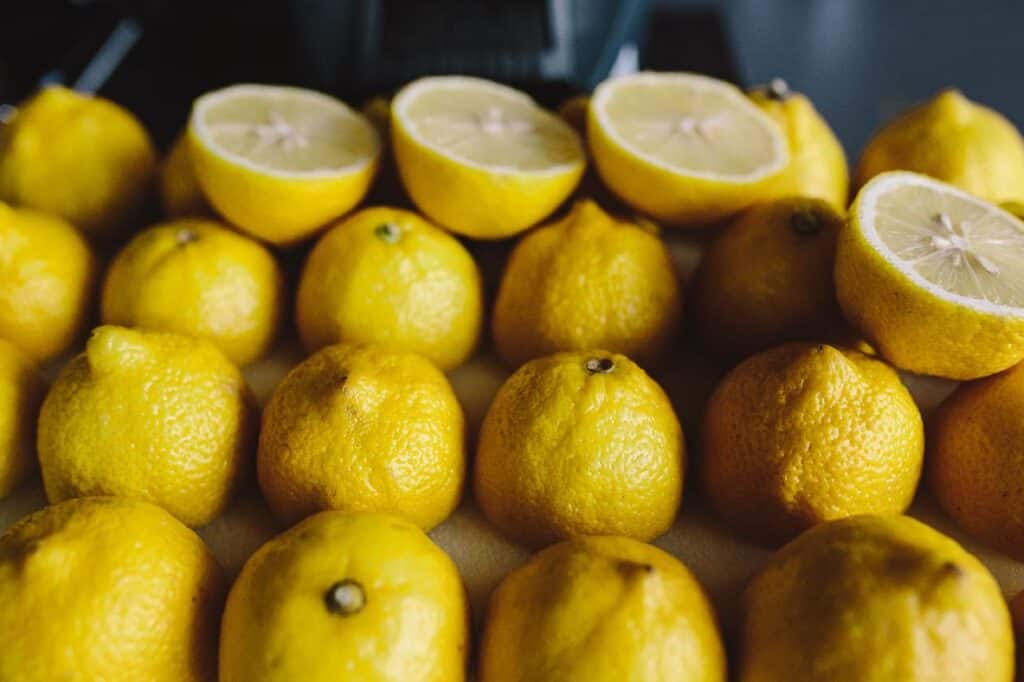Lemon juice is awesome. It brings its sharp, sour flavor as the perfect counter to sweetness in baked dishes and on crepes. It can be used to bring out the deeper flavors of meat dishes. And, with a little (or a lot) of sugar, it can be turned into an awesome natural lemonade. But is there a darker side to using lemon juice and are we inviting a fire into our home when we use it?
Lemon Juice is not flammable. The majority of lemon juice is water and as you know, water is not flammable. Even if the minor ingredients in lemon juice were to be flammable, the water content would extinguish any fires before they had the chance to grow.
Though lemon juice itself is not flammable, there are some interesting properties of lemons and fire. Here’s what you need to know.
Your # 1 priority is keeping your family safe. As a firefighter, I recommend everyone has updated smoke detectors that don’t require battery changes, like these ones from Kidde, a fire extinguisher, like this one from Amerex, and a fire escape ladder if you have bedrooms above the first floor, I recommend this one from Hausse.
Also read: What Makes Something Flammable?
What Is Lemon Juice?

Lemon is the fruit of an evergreen tree, the Citrus limon, which is native to parts of Southern Asia (and mainly in Northeast India). It may sometimes be confused with other citrus fruit such as limes and calamansi, but the bright yellow skin of lemon is unmistakable, as is the bitter taste of the fruit.
Lemon juice is what you get when you squeeze a lemon and then discard the skin and the majority of the pulp. It is, as with all fruit juices, mainly water and it contains citric acid to about 5-6% which is a very strong concentration of this acid and it’s what gives lemon that sourness that is unmatched by nearly any other fruit.
Lemon juice is popular in a wide-variety of uses but it’s particularly popular in cooking. Anyone who has ever enjoyed a slice of lemon meringue pie will know why.
It may also be used in electrodes, as a hair bleach, for aromatherapy and as a source of citric acid.
Lemons also contain something called limonene that I will talk more about below.
Can It Burn?
Lemon juice is not, under any circumstances, flammable. It contains so much water that it would be impossible to set it on fire, and if it became too hot – it would evaporate before doing so.
This shouldn’t come as a huge surprise.
However, citrus fruits like lemons due contain a chemical in the skin (rind) called limonene. This is a hydrocarbon and is flammable. Limonene has a flashpoint of 118 degrees Fahreneheit (48 Celsius), which allows it to catch fire quite easily.
Take a look at this video for a demonstration of limonene flammability:
Can A Lemon Start A Fire?
So, now that we know lemon juice isn’t flammable, isn’t it a huge contradiction to say that lemon juice can start a fire?
No, we’re not going to burn lemon juice to use it to start a fire. That wouldn’t work and would make us look pretty silly, what we’re going to do is tap into a different chemical property of lemons to create our (theoretical – there’s no need to try this at home) fire.
What we’re going to rely on is the fact that lemon juice is an electrolyte. Thanks to the citric acid content it forms nice strong ions and these can be used in conjunction with electrodes (zinc nails and copper clips, will do nicely for this) to create an electric current.
You pop the electrodes, in series, in your lemon. Then you connect wires to each end and then touch them together against steel wool. This will then start to spark.
Place the sparking steel wool over something nice and flammable, toilet tissue would be fine, and watch it catch fire.
Check it out here:
That’s how you use a lemon to create a fire without setting fire to the juice.
However, you should note – at no point during this process will you set fire to the lemon.
An Unusual Property Of Lemon Juice In The Presence Of Heat: Invisible Ink
One other cool, fire-related, property of lemon juice is that it can be used to create an “invisible ink” and, in fact, for many years it was used as an invisible ink in espionage activities – though in more modern times it has been replaced with compounds that are a bit more robust than lemon juice.
How does that work?
Well, lemon juice is basically clear at room temperature. You can test this by squeezing some yourself and holding it up to the light.
When you use it as an ink to write on ordinary paper, that very faint yellow/green of the liquid is lost and once it dries, whatever you have written is invisible.
If you then take the paper that you wrote on and heat it gently in a flame – you need to be careful doing this, the objective is to be able to read the words not set fire to the paper – the compounds in the lemon juice break down and this releases carbon into the paper. This is seen as a brown stain and it makes your words legible.
Watch it in action here:
What About Lemons?
No, lemons are not flammable. Again, they’re mainly water and are unlikely to catch fire. You can dry out lemons but even the dried end product is not particularly flammable though it would be combustible.
Orange Juice?
Orange juice, rather like lemon juice, is made up mainly of water (and, in fact, it contains much less citric acid than lemon juice) and thus, it’s not flammable.
Lime Juice?
For the same reasons that orange juice and lemon juice aren’t flammable, lime juice is not flammable, either. It’s made up mainly of water. Water doesn’t burn.
Related Articles
Is Honey Flammable? Will it Catch Fire?

